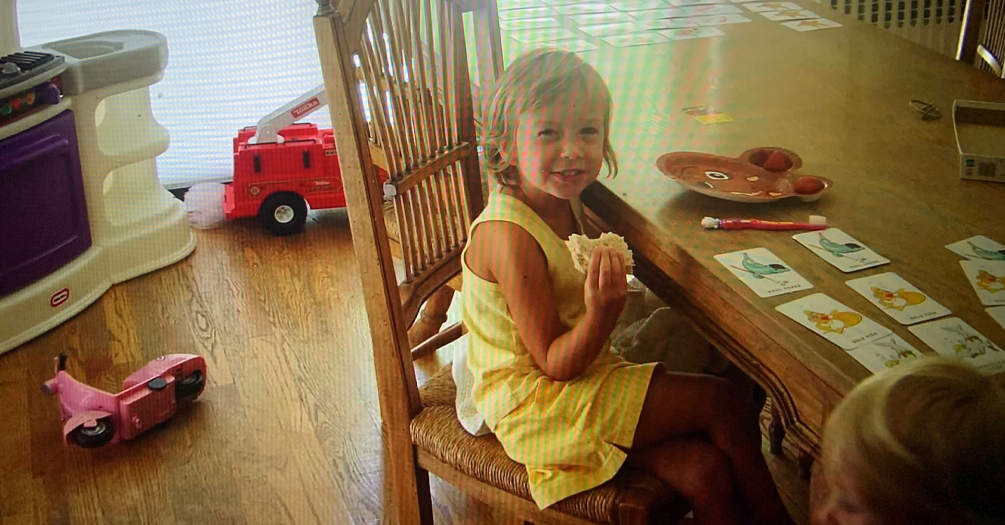The smallest in the class

Hailey Jurgens
Master’s student in Nutritional Sciences
Growing up, I was always the smallest child in the class. Not only was I short, but I was also thin, sometimes surprisingly so. Doctors were always scaring my parents by telling them that I was falling behind the “normal” growth chart and encouraging them to continue to make me eat more.
One of three kids growing up, I was always the last one at the dinner table. I am not saying I wasn’t a picky eater; I was. Texture, look, and smell were my priorities, and I knew what I liked to eat. But eating enough vegetables was never an issue. For dessert (if I would eat enough of my dinner), I had strawberries or some other fruit, while my siblings indulged in ice cream and chocolate. One summer, I even had to drink Ensure to see if those extra calories would allow for me to “catch up to the curve.” But no matter what I ate, I never caught up.
I was about 8 or 9 years old the first time someone ever accused me of having an eating disorder. I remember it like it was yesterday. Some mean girls I was forced to sit with—due to assigned lunch seats—were making comments about the quantity of food in my lunchbox. Was my yogurt, fruit, goldfish, and sandwich enough? When one girl turned to the others and said, “Well, at least she’s eating something. She’s so anorexic,” I came home crying to my mom, and I didn’t even know what the word meant.
By the time I reached high school, I grew more than six inches in just a few years and was no longer the shortest of my friends. I distinctly remember one doctor's visit where my pediatrician acknowledged how concerned they were for me when I was younger and how funny it was that I simply made my own curve on the growth chart. So, I grew, I made up my own curve, and just like that, I was “healthy.”
But I didn’t necessarily feel healthy. What about the way people perceived my thinness, my body? Those comments never went away. They followed me through middle school when we had to change for gym class. And through high school, when guys felt like it was okay to say them about me too. Even college.
I felt like everything I was eating when I went out with friends was being watched and discussed. Eventually I questioned it, they had me questioning my own eating behaviors. I started looking into new recipes and became passionate about food.
In high school, I researched and l met with a sports nutritionist who spoke about fueling our bodies. I actively practiced nutritious eating. Not only did it benefit me in athletic performance, but I ended up doing research in nutritional support and recovery during my undergraduate experience.
I was still curious why people were watching me. What was I doing or not doing that everyone else cared about? So, I watched back. I learned about eating disorders in my classes. I observed and reflected on all these other people’s behaviors of eating. Those making comments about me were the same ones skipping meals. They were the ones going on diets at 15. In college, they were calorie counting so that they could drink that night. They were all comparing themselves to the images of models and actresses on TV or on Instagram. And the people putting that media out there are promoting these behaviors—advertising themselves as some sort of success stories. They praise how much better being skinny is, how much “healthier” they are, how much better looking they are.
But when you grow up in a generation where social media is at your fingertips 24/7, people start to believe it. In fact, the influence of media is associated with an increased risk of body dysmorphia. A recent prevalence increase of body dysmorphia is cause for concern for Generation Z. The increased social media influence is a factor for the decline in body image perception. How one is perceived online has become a focus for young adults and adolescents. This opens a world of opportunities for insecurities involving body weight, body shape, calorie intake, and exercise. On the same platforms impinging on young adults are influencers who are paid to promote products that are supposedly “life-changing.”
People who have no credentials to be offering dietary guidance are vouching for harmful behaviors. Eating disorders can lead to kidney failure, osteoporosis, tooth decay, and in some cases heart attacks. Regardless of several studies showing how disordered eating can be successfully overcome through therapy and appropriate treatment, many insurance companies either restrict or deny care. This is a public health issue that impacts 5 million of individuals in the US every year. Although the prevalence in females is higher than males, eating disorders impact all genders and people of all ages. Despite the prevalence and being considered the mental disorder with the highest mortality rate, eating disorders are commonly not addressed as a public health issue and are referred to more as a fad.
Experts claim that the prevention starts with us stop thinking of eating disorders as simplistic issues or that people are just doing it for attention. They also say that the idea of disordered eating is exacerbated by others through objectivization and mistreatment of others. All those years of people making comments about my body contributes to this idea. For the longest time I did not speak about the bigger issue of body image and eating disorders because I thought, “Who wanted to hear it from the thin girl who never had to think twice about her weight?” But I did have to think twice. I had to think about it a lot.
So where do we go from here? Do we keep tearing each other apart until absolutely no one likes what they see when they look in the mirror? Or, as public health experts, do we start addressing the lack of resources dedicated to those with body dysmorphia or eating disorders—and start to acknowledge the impact social media and influencers have on the way we feel about the way we look?
About the author
 Hailey Jurgens is a first-year Master of Public Health student at the University of
Michigan School of Public Health. She is studying Nutritional Sciences on track to
become a Registered Dietitian.
Hailey Jurgens is a first-year Master of Public Health student at the University of
Michigan School of Public Health. She is studying Nutritional Sciences on track to
become a Registered Dietitian.
- Read more about childhood health on the Pursuit
- Read more from the Power of Public Health Storytelling series
